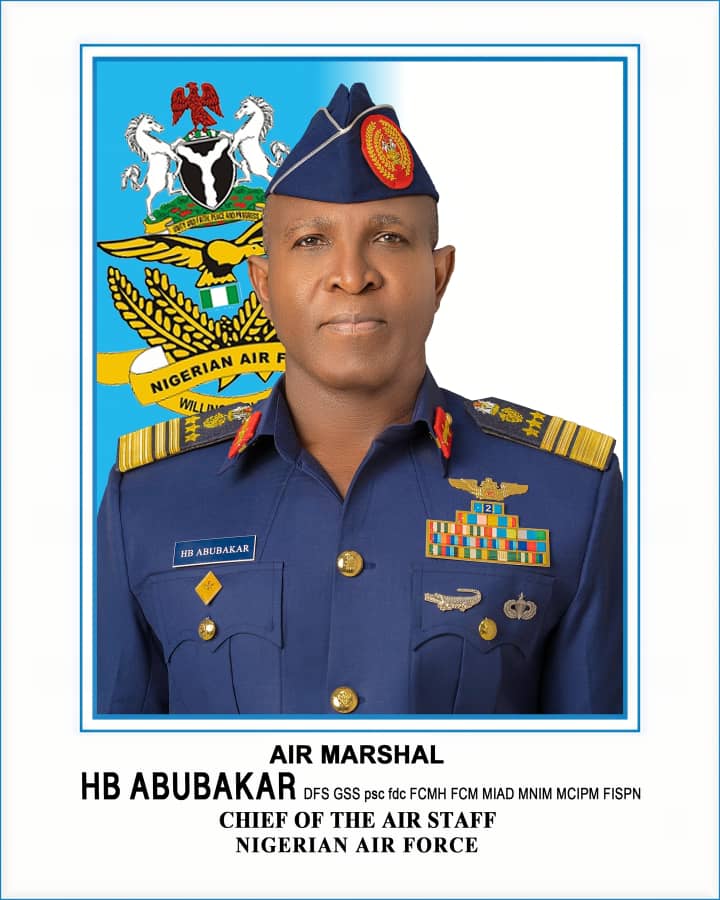Huhuonline.com can now authoritatively report that Air Marshal Hasan Bala Abubakar, Nigeria’s Chief of Air Staff (CAS), is expected to be replaced in the coming months, sources say, as the Nigerian Air Force (NAF) faces mounting operational, modernization and financial challenges. Since his appointment in June 2023, Abubakar’s tenure has been defined by ambitious efforts to modernize the Air Force, including the acquisition of 24 Italian-made M-346 attack jets and 10 AW-109 Trekker helicopters. These acquisitions, according to NAF insider sources, are part of a broader fleet renewal strategy aimed at strengthening the Air Force’s operational effectiveness. The first three M-346 aircraft were expected to be delivered by early 2025, with subsequent deliveries running until mid-2026. The Trekker helicopters are expected by early 2026.
Additionally, Abubakar has emphasized the need for a maintenance hub in Nigeria to support the new M-346 fleet, highlighting the importance of establishing domestic infrastructure maintenance hub to ensure long-term fleet sustainability. However, financing these projects has proven exceedingly difficult, according to sources; and this has put Abubakar on a collision course with many Tinubu loyalists, most notably the Central Bank of Nigeria (CBN) governor, Olayemi Cardoso. The Air Force relies on foreign currency for international procurement, and recent CBN reforms have triggered a scarcity of foreign exchange, complicating payments for aircraft and spares. Sources told Huhuonline.com that Tinubu has had to weigh in several times to settle schisms between Abubakar and Cardoso. Budgetary constraints are further compounded by a strained working relationship with the National Assembly leadership, making it difficult for Abubakar to secure timely appropriations for modernization projects.
These challenges have been compounded by a heavy reliance on foreign countries for aircraft and spare parts, a situation that Abubakar has expressed dissatisfaction with, advocating for greater self-reliance in aerospace technology. Aso Rock sources told Huhuonline.com that while Abubakar has publicly advocated for domestic maintenance capacity and operational readiness, the combination of funding shortfalls, legislative friction, and forex scarcity has slowed the Air Force’s progress. Insiders suggest that these challenges have contributed to President Tinubu’s decision to consider a leadership change at the top of the service.
Multiple NAF sources who spoke to Huhuonline.com on conditions of anonymity confirmed that procurement delays are having a compounding effect on the NAF’s operational readiness. The specific impacts include limiting the fleet’s serviceability, restricting operational capabilities, increasing maintenance backlogs, and hindering combat effectiveness against security threats. The most direct impact of procurement delays is on the NAF’s ability to maintain its fleet. Huhuonline.com understands that as of July 2025, the NAF’s serviceability rate was 72%, though Abubakar set an ambitious goal of 90% by the fourth quarter. Secondly, delayed or non-delivery of critical spare parts and equipment from foreign vendors directly affects the NAF’s maintenance schedule. As older aircraft spend more time grounded for repairs, they contribute to a growing backlog of maintenance work, which further limits the number of available air assets.
One NAF source refused to blame Abubakar for the present quagmire but bluntly said: “A fleet with a low serviceability rate cannot deploy its full airpower when needed, which degrades overall operational capability. This is particularly critical for Nigeria, which is fighting ongoing insurgencies and internal security threats. The inability to rapidly deploy air assets due to maintenance issues hampers the NAF’s ability to provide air support, conduct reconnaissance, and carry out air strikes effectively.”
A source close to the National Security Adviser (NSA) Nuhu Ribadu confided to Huhuonline.com that maintenance burdens have increased under Abubakar, and this has infuriated President Tinubu, who has accused the air force chief of leadership failure. However, one NAF source explained that delays lead to longer-term and more expensive maintenance issues. The source said Aso Rock was just trying to give Abubakar the proverbial bad name in order to hang him. “NAF has a growing dependence on foreign-sourced parts and expertise for its newer and more complex aircraft, such as the M-346 and AW-109 helicopters. When international payments are stalled due to forex shortages, it directly affects the availability of these foreign maintenance resources. While NAF has made efforts to localize maintenance, this process is still ongoing and cannot yet compensate for delays in accessing foreign spares. So, how does this become Abubakar’s problem,” he asked rhetorically?
One Aso Rock source close to the president told Huhuonline.com that the problem with Abubakar is that he promised too much and has delivered very little. “What he has done is to catalogue and detailed all the issues and problems in the air force, but the president wants someone who will provide solutions to these problems; not someone who regularly complains about the problems,” the source noted.
Ultimately, all these issues impact the NAF’s ability to perform its core security missions.
A 2021 symposium hosted by the Nigerian Army acknowledged that logistical challenges had seriously impacted the military’s campaign against insurgencies in the northeast and banditry in the northwest. Procurement and logistics issues create weaknesses that are exploited by well-armed, determined enemies, according to a 2014 Reuters report. The NAF’s ability to support ground troops, conduct timely operations, and provide adequate surveillance is directly affected by these delays.
Despite these obstacles, the NAF continues to pursue fleet expansion and improved serviceability, but the potential departure of Abubakar raises questions about the future direction of Nigeria’s air defense capabilities and the government’s commitment to addressing systemic modernization challenges.





